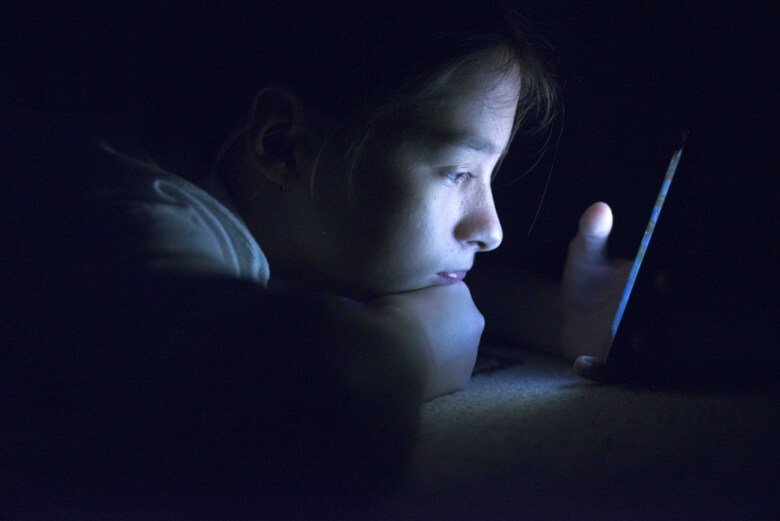How screen habits affect children's health

Screen time is often associated with poor health in young people, but it is more complicated than that, say researchers. We are affected, but differently and not just negatively. What we do on our phones – and what we do when we are not using them – also plays a role in our well-being.
Text: Maja Lundbäck, written in Swedish for the magazine Medicinsk Vetenskap no. 2 2022
Most people have noticed that it can be difficult to put down their mobile phones. Children and adults alike are spending more and more hours a day on screens.

“Like good food, it can be hard to limit your intake. Moreover, screens provide quick rewards,” says Anders Nilsson, who researches young people's screen habits, computer gaming and the link to poor mental health at the Department of Clinical Neuroscience at Karolinska Institutet.
There is no official diagnosis called screen addiction. However, according to the World Health Organization (WHO), too much recreational sedentary screen time, i.e. screen time that involves sitting still and does not involve work or study, is considered a risk factor for both physical and mental health. According to the WHO, babies should not have any screen time at all, and children up to the age of five should spend no more than one hour a day in front of a mobile phone or tablet. But there has not been much research on the impact of screen use on our health. Of course, this does not stop the subject of screen time being hotly debated – quite the contrary.
"Today, the debate about screen time is polarised, but you do not have to think it is good or bad," says Anders Nilsson.
Children online at least three hours a day
Age 9–12: 43 percent
Age 13–16: 75 percent
Age 17–18: 81 percent
Source: Swedish Media Council report “Ungar och medier 2021” [Young people and media 2021]
Time is not what matters most
There is a lot of evidence to suggest that it may not be the minutes and hours spent in front of the screen that have the greatest impact on our well-being. There are probably other more important factors when it comes to how gaming, social media or general idle surfing affects us. Who we are, our gender, and what we do in front of the screen may matter more – as may what we actually do when we are not hanging out there.

Mats Hallgren, researcher at the Department of Global Public Health at Karolinska Institutet, has looked at young people's mental health, and compared young people who play computer games very little, max once a week, with those who play at least an hour a day.
"The results surprised me. Those who played computer games very little had more depressive symptoms than those who played a lot," he says.
At the same time, he asserts that playing computer games is not the same as watching TV; it is much more mentally activating. Moreover, young people usually play with others, which makes it a social activity, he explains.
Effects social media and computer games differ
The girls in the study spent much less time playing computer games than the boys, as a number of other studies have also shown – instead spending more time on social media. Consuming large doses of social media has a completely different impact on mental well-being than computer games, his study shows.
"The effect was the opposite of computer games. In our study, being a girl and using a lot of social media is associated with poorer mental health over time," says Mats Hallgren.
The boys consumed much less social media than the girls, and were not negatively affected mentally by it. We do not really know what the gender differences are due to, but there could be many explanations related to culture rather than biology.
"Bullying on social media may play a role – as can comparing oneself to others. We also do not know how the brains of those who spend a lot of time on social media are affected. But it could potentially affect the important neurotransmitters dopamine and serotonin," he says.
Vulnerable children may be negatively affected
Social media mainly attracts girls, but just as screen addiction is not yet classified as a diagnosis, there is no diagnosis called social media addiction.

"It is a problem. We can see that social media can have very negative effects, especially for girls. Children who are already vulnerable and have problems with anxiety and depression are at greater risk of being affected and developing problems such as an eating disorder," says Lisa Thorell, researcher in psychology at the Department of Clinical Neuroscience at Karolinska Institutet.
Social media should not be judged as only bad for us, she clarifies. What you do when you use social media matters.
“Social media also has positive effects, in that it is social. But there are indirect negative effects - like taking time away from other things, like physical activity, time with friends, and sleep,” says Lisa Thorell.
In a study of university students in Sweden and Italy, she and her colleagues dug deeper into how people who use social media a lot are affected psychologically.
"When you use social media quite a lot, it is common to focus on it even when you are not using it, and to become irritated and go into withdrawal. We also found that problematic social media use was more strongly associated with social problems, psychosomatic symptoms and poor self-image compared to problematic computer game use,” says Lisa Thorell.
At the same time, she stresses, we do not know how those who experience negative effects from social media would have felt without it.
“But there is a lot of evidence to suggest that if you have an increased susceptibility to developing problems with social media and use it a lot or come into contact with bad content, the psychosocial problems are amplified,” says Lisa Thorell.
Gaming disorder – a controversial diagnosis
Although research does not point to all computer gaming as negative for the psyche, there are concerns. Unlike social media addiction, gaming disorder (i.e. addiction to computer gaming) is classified as an addiction diagnosis by the WHO. But the diagnosis is controversial, explains Anders Nilsson, who is conducting several behavioural studies specifically on computer gaming that has become problematic for the individual in that it has spilled over into other areas of life and led to far-reaching negative consequences in areas such as school and relationships.
At the same time, we must not forget that computer gaming can also have positive effects on health, according to Anders Nilsson.
“We do not know much about the cause and effect, or how those who play so much that they need treatment would have fared without their gaming. Some people who overdose on computer games might have ended up in other risk situations because they have such a tendency – would it have been better or worse? You can see that alcohol drinking is declining among young people, and computer gaming may be contributing to this to some degree,” he says.
Concerns about lack of physical activity
The fact that physical activity suffers from too much computer gaming and other screen time worries many. Young people are moving less and less, and obesity is creeping down the age scale, especially among boys. In a study of more than 1,000 teenagers conducted at the Swedish School of Sport and Health Sciences by Gisela Nyberg, a researcher at the Department of Global Public Health at Karolinska Institutet, researchers found a link between screen time and poor cardiovascular health.
The teenagers themselves were asked questions about their level of physical activity and how much screen time they had. Those who responded that they participate in some form of sporting activity had better fitness levels, according to a cycling test they were given.

Ylva Trolle Lagerros, physician at the Obesity Centre in Stockholm who is currently researching the impact of lifestyle on health and future morbidity at the Department of Medicine, Solna at Karolinska Institutet, was quite convinced a few years ago that more screen time is associated with less physical activity – and that this could partly explain the high rates of obesity in socially deprived areas, where children usually have less scheduled sporting activity. To see whether the hypothesis was correct, she and her colleagues conducted a small study of 121 pupils in compulsory school grades 4 through 9 at two schools in widely different socioeconomic areas. In one school, 31 percent of the children were overweight.
“What sets our study apart from many others is that we have objective measures of physical activity and screen time rather than self-assessments,” she says.
The results Ylva Trolle Lagerros obtained were not at all what she expected.
“We could not see any link between physical activity and screen time. Physical activity did not compete with screen time. Nor was there more screen time in the lower socioeconomic area,” she states.
Moreover, there was no link between parents' screen time and that of children.
“So, it does not seem to be what we do as parents that is important. Our teenagers are growing up in a culture where there is a lot of screen time, and that time is hard to overcome,” she says.
However, the boys had five times more screen time in the form of gaming than the girls.
“We also saw that the girls were more physically active than the boys,” states Ylva Trolle Lagerros.
When she asked the children if they were satisfied with their screen time or if they wanted to increase or decrease it, she found more differences between boys and girls. The girls were either satisfied or wanted to reduce their screen time, while for the boys it was the other way around.
The study is small, and Ylva Trolle Lagerros wants to be underscore that more large-scale studies are needed to verify the results. Unlike Gisela Nyberg's larger study, she did not examine the fitness level of the children.
Swapping social media for physical activity
The complexity of the relationship between screen use and poor mental and physical health is revealed in another study involving Mats Hallgren. In it, researchers followed several thousand teenagers for five years and, as expected, found that physical activity declined while poor mental health rose. In a follow-up study, the researchers looked at what happened after they asked participants to swap one hour of screen time for one hour of physical activity.
“In our study, swapping an hour of social media use for an hour of exercise was associated with improved mental health – the effect was strongest in girls and most apparent in those who exercised in groups,” he says.
In contrast, replacing an hour of computer games with exercise had no such effect. Mats Hallgren says that experimental studies are now needed to answer the question of what happens in young people's brains with different types of screen usage.
In cases where there is increased vulnerability, the health challenges are likely to be greater – and the risks of poor health higher, Anders Nilsson believes. One of his ongoing studies on screen habits and excessive computer use is based on children and young people between the ages of 12 and 17 who are enrolled in Child and Adolescent Psychiatry Services (BUP).
“In addition to seeing whether there is a link between screen habits and excessive computer gaming and mental health, we will investigate whether these children's habits differ from a non-clinical group,” he says.
He is also conducting a study using the twin registry to find out how environmental factors can influence the risk of computer gaming having negative consequences.
“I want to find out how much of the time spent gaming is due to genes, and how much is explained by environmental factors. This is a relatively unexplored field,” he says.
Children with ADHD are at extra risk
Today, research by Lisa Thorell shows that there is a clear link between ADHD and excessive computer gaming. In an as yet unpublished study, she followed children with an early ADHD diagnosis from preschool to grade 6 of compulsory school.
“19 percent of children with ADHD met the criteria for gaming disorder, compared to two percent in the control group,” she says.
There may be neuropsychological as well as psychosocial reasons behind this.
“There is a lot of evidence suggesting that children with ADHD are at extra risk because of the fast-paced rewards of games and social media. It suits their personality,” she says.
But children with an early diagnosis also have more peer problems than others, find it difficult to participate in extracurricular activities, and often do not do well at school,” explains Lisa Thorell. Then, computer gaming becomes a way to relax and unwind.
“Many parents report that their children's gaming is an escape. But we have also seen that parents who have children with ADHD are more positive about gaming, because it adds something positive to their children's lives,” says Lisa Thorell.
Today, research is not able to keep up with technological developments, and it is difficult to do studies over a long period of time as new forms of gaming and social media are constantly emerging.
“It is currently difficult to say with certainty what the risk factors are – and how to intervene early and prevent them,” says Lisa Thorell.
Tips for better screen habits
There are ways to help your child take control of their screen use. Here are Anders Nilsson's best tips:
Young children: Most are taught not to eat sweets every day. Saturday gaming may not be the only solution, but just like Saturday candy, children can be taught to understand that there should not be too much gaming.
Slightly older children: Make sure your child gets a good balance between screen time and other activities. Show interest in what your child is playing. Keep an eye on them to make sure they do not get into trouble. Teach your child to be aware of the feelings that make them want to play – and what they are missing out on if there is a lot of screen time. Be aware that children have a tendency to get stuck in patterns.
Older children: Have a discussion and talk to your child about having a balance in life, and about what role gaming, social media and other entertainment-related screen time plays in their lives. Do not forget to listen to how your child sees things. Show interest in the screen activities. Pay attention to whether the screen time is joyful and enriches the child's life, or whether it has negative consequences.
